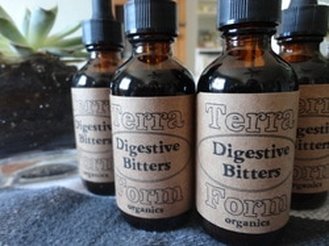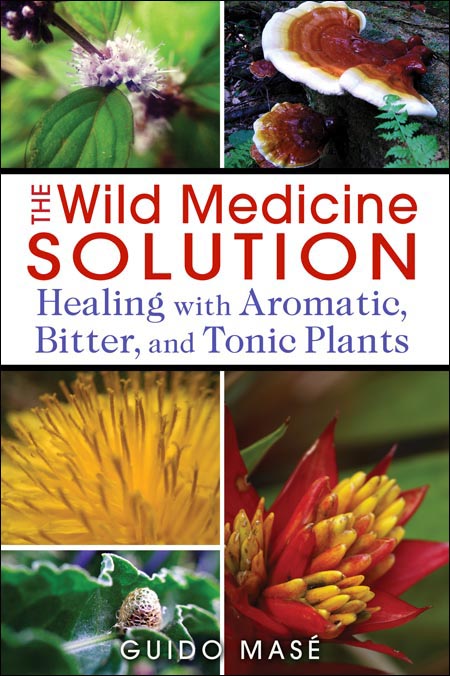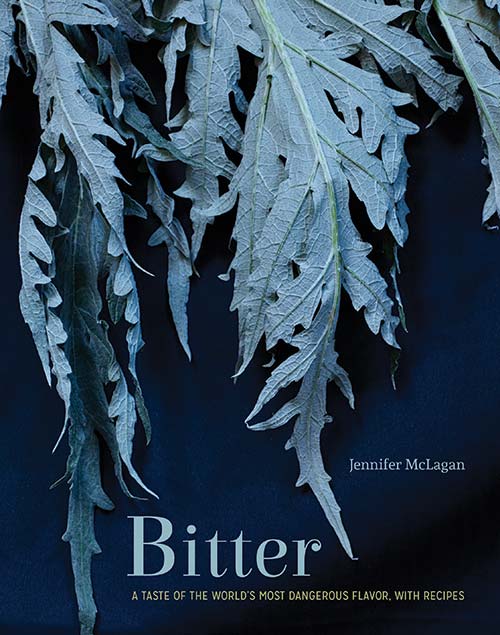 The use of bitters has been a growing trend over the last several years, both in health food stores and herbalism communities, as well as in the craft cocktail world. There has been a long tradition of using aperitif and digestif liquers to sip before and after meals, but adding in tinctures of "digestive bitters" is only recently coming back into the mainstream. As a nutritionist who sees a lot of folks with digestive issues, I recommend everyone who struggles with these issues add bitters into their life (I even make my own!). But what is it about these herbs and foods that are so necessary and healing? According to Guido Mase, author of The Wild Medicine Solution and herbalist for Urban Moonshine (the uber popular herbal brand that is helping bring bitters back), it is the challenge that bitters present that make them so powerful. The tongue has receptors for sweet, sour, salty, savory and bitter. When you eat a bitter food like dandelion leaves or even drink black coffee, a signal is sent from one of the several different chemicals, such as alkaloids, that read as bitter, and stimulate secretions all along the digestive tract. Unlike the other tastes like salty or sweet, the bitter taste receptors, known scientifically as T2R receptors, are found all along the digestive tract--not just on the tongue. In The Wild Medicine Solution, Mase writes that the receptors are found in tissues in the throat, stomach, small intestine, pancreas, liver and gallbladder. They have also been found in the lungs and brain, and may be able to affect the nervous system. So, these bitter foods and herbs are encouraging digestion throughout the body, not just in the mouth. The bitter taste in plants is protective for them, so that predators of the plant would not eat too much and kill it. But, in smaller doses of plants that are known to be safe for humans, they can have a beneficial effect because of that challenge to the system. The modern diet has taken out many of these challenging bitter plants, like the wild bitter greens, and replaced them with milder counterparts, like domesticated salad greens. The sweet and salty tastes, which are now easy to come by due to mass-production and large-scale agriculture, are the prevalent flavors. The need for bitter to balance out the worldwide sweet tooth and default to easier, milder flavors is more important now than ever. Digestive problems like heartburn/acid relfux, gas, bloating, constipation, diarrhea and of course a poor microbiome are becoming extremely prevalent. By adding in bitter herbs, healing can begin to happen and these issues can improve over time. Bitters may be able to act on the nervous system as well, and stimulating the vagus nerve has been linked to better digestive health and improve gut motility, as well as weight management. In addition to improved digestion, bitters can also help the body in other ways. Because of the ability of bitters to improve liver metabolism and its detoxification, bitters can also help protect the body from toxins and poisons. They were used for ages for this purpose by traditional healers and, while now we may not be as susceptible to poisoning, we are constantly bombarded with toxic and endocrine-disrupting chemicals. By creating an environment inside us that can easily rid the body of these chemicals, we will likely be healthier in the long run. Bitters have also been shown to improve blood sugar, regulate appetite, lower inflammation and even improve issues in the skin and allergies, which are usually linked to poor liver or digestive function themselves. There are few modern ailments, as the product of a highly processed diet and industrialized world, that bitters cannot help at least somewhat. Many people who are suffering with impaired digestion and even their health practitioners often focus on elimination of certain foods or even adding in other things like probiotics. While these are necessary, this is only part of the picture. By adding in more bitter foods, or even bitter herbs in the form of a tincture, much more progress can be made. Besides adding in a few drops of digestive bitters tincture with your meals, you can also begin to eat more bitter foods everyday. Plants like burdock, dandelion, grapefruit, arugula or cocoa are all fairly common bitter foods that can be added to the diet. I love the cookbook Bitter by Jennifer Lagan for recipe ideas and gorgeous pictures if you need some inspiration! If you are adding in a digestive bitters tincture or other herbal preparations of stronger herbs, you may want to consult a professional herbalist or your health care practitioner first, especially if you are pregnant or nursing, as some of these herbs are contraindicated. I highly recommend reading Guido Mase's Wild Medicine Solution and DIY Bitters by Mase and Jovial King as well, especially if you are interested in diving deeper into the science of bitter and other healing herbs!
0 Comments
Leave a Reply. |
Brine & Broth
I am a gut health-focused nutritionist and online health coach based in Southwest Wisconsin. My recipes and philosophies center around traditional, nutrient-dense foods that support robust gut health. Archives
May 2022
Categories |



 RSS Feed
RSS Feed
